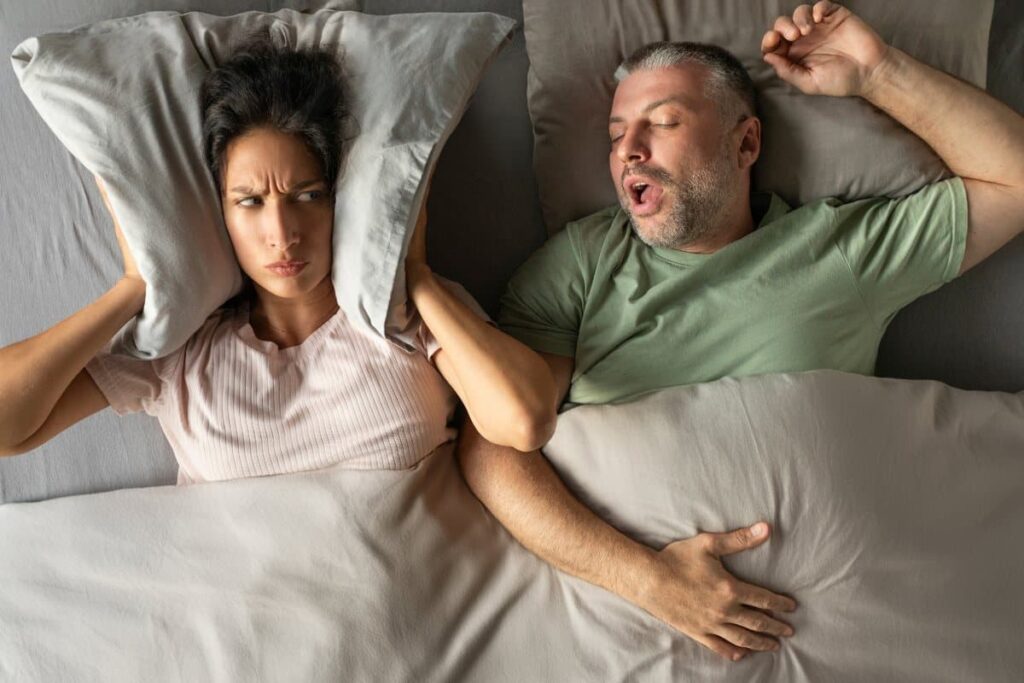
Sleep Apnea & Snoring Solutions
Do you have a CPAP Machine for sleep apnea that you use less than 5 times per week?
While CPAP is typically considered the best sleep apnea therapy, many struggle with it and aren’t aware of a practical dental solution for mild to moderate sleep apnea.
If you need an effective alternative, we can help. A mandibular repositioning appliance, a medical-grade dental device, can reduce snoring by up to 90% by positioning your lower jaw and tongue forward to keep your airway open.
We’ll work with your sleep physician and help you access follow-up sleep studies.
Take Our Sleep Apnea Questionnaire
Mandibular Repositioning Appliances
Mandibular repositioning appliances are an effective solution for treating sleep apnea.
- Using a digital impression, we custom-fit this dental appliance with minimal bulk to increase your comfort.
- It works without CPAP to keep your airway open for mild to moderate sleep apnea and snoring.
- This dental appliance can be used with CPAP if you choose to continue using it. If your CPAP machine works for you, we recommend continuing, especially for severe sleep apnea.
Experience the benefits of restful sleep with our help. Contact us for a complimentary sleep apnea discussion.
TMJ & Facial Pain Solutions
The temporomandibular joints (TMJ) are 2 joints situated in front of the ears that connect the lower jaw to the skull. TMJs are intricate structures that include the mandible, skull base and side, muscles, ligaments, the articular disk, and bones.
TMJs allow the jaw to slide and rotate, moving up and down, side to side, or forward and backward. Proper jaw alignment is important for the smooth movement needed for talking, chewing, and swallowing.
When these complex parts aren’t aligned or moving together smoothly, problems can develop, such as facial pain and difficulty moving your jaw.
What Are Temporomandibular Disorders (TMD)?
Temporomandibular joint disorders—often referred to as TMD or TMJD—are a group of disorders that impact the jaw joints, jaw muscles, and nerves surrounding the joints.
Any problem that prevents the complex and synchronized system of muscles, bones, and joints from working together can lead to TMD.
Common TMD Symptoms
Jaw joint disorders can cause a broad range of symptoms, from mild to severe, depending on the condition’s cause. Common TMD symptoms include:
- Jaw joint pain or discomfort
- Aching in or around the ear
- Face and neck pain
- Pain or tenderness in the jaw area
- Locked or limited jaw movement
- Difficult and uncomfortable chewing
- Clicking sounds when chewing
- Facial swelling
- Toothaches or worn-down teeth
- Tinnitus (ringing in the ear)
- Headaches
- Sleep apnea
If you notice any of the above symptoms, our dental team recommends an examination to check the joints and listen for any unusual sounds. Digital X-rays may also be recommended for a thorough look at your TMJs.
Please contact our office to make an appointment.
Headaches & Migraine Solutions
Chronic headaches and migraines can be significantly debilitating, impacting mood, work, and daily activities. Identifying the root cause is crucial for those suffering from these conditions. Sometimes, a treatable condition like Temporomandibular joint disorders could be a factor.
An assessment with our dental team is the first step toward finding relief.
Don’t suffer in silence any longer. Reach out to us today, and let us guide you toward potential options and solutions for relief.


